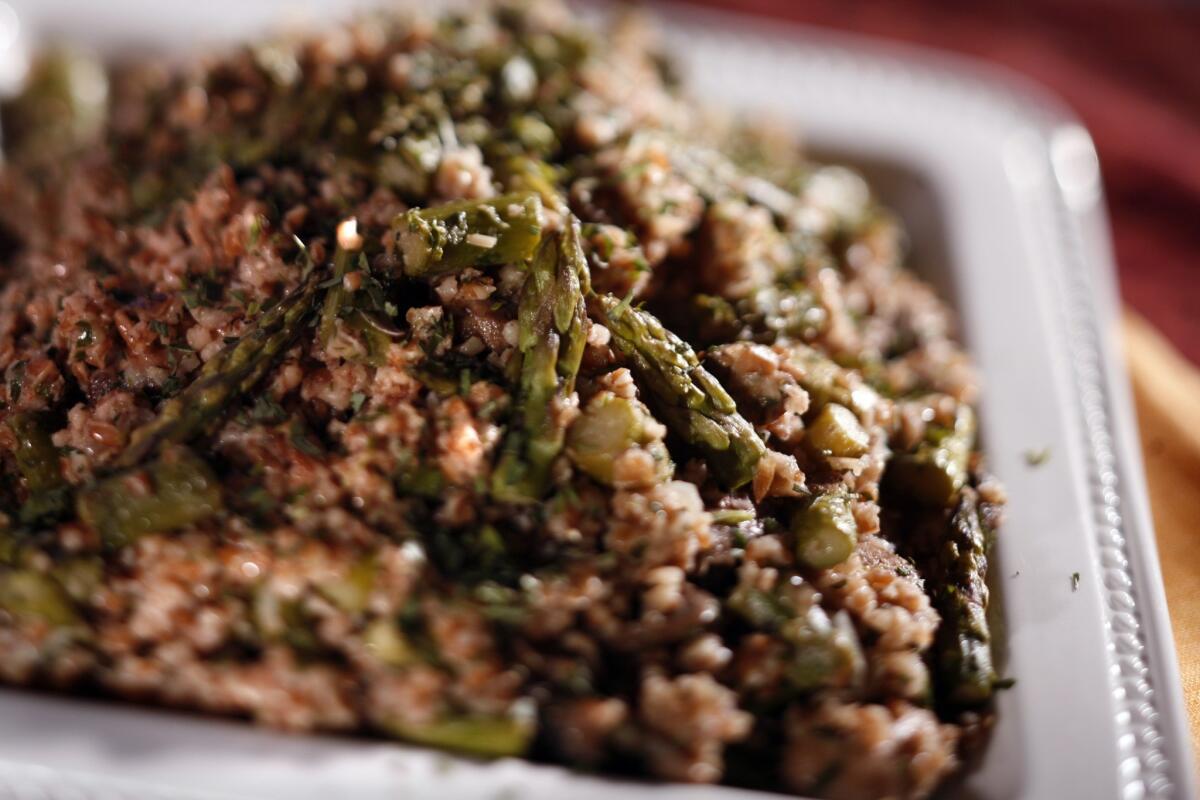Recipe: Bulgur pilaf with asparagus, mushrooms and tarragon

- Share via
Bulgur pilaf with asparagus, mushrooms and tarragon
2 hours. Serves 4 as a side dish
1 (1-pound) bunch medium asparagus
1/2 pound button mushrooms
2 tablespoons plus 1 teaspoon chopped fresh tarragon (stems reserved), or to taste, plus more for garnishing
2 tablespoons chopped Italian parsley (stems reserved), plus more for garnishing
3 cups water or light vegetable broth
Salt
2 tablespoons extra-virgin olive oil, divided, plus more for drizzling
2 tablespoons butter or additional olive oil, divided
1 onion, finely chopped (about 1 1/3 cups), divided
2 cloves garlic, minced (about 2 teaspoons)
1 cup (about 5½ ounces) bulgur, medium-coarse (No. 3) or medium (No. 2)
Freshly ground pepper
1/2 teaspoon semi-hot red pepper such as Aleppo pepper or pinch of cayenne pepper, or to taste
2 tablespoons pine nuts
1. Trim the tough ends from the asparagus, reserving the ends for flavoring the broth. Cut the asparagus spears in 1-inch pieces. Cut off 1 thin slice from the tip of each mushroom stem, and reserve the slices to flavor the broth.
2. To make the broth, combine the asparagus ends, mushroom stem slices, tarragon and parsley stems in a saucepan. Add the water, cover and bring to a boil. Cover and cook over low heat until the broth is aromatic and delicately flavored and the asparagus ends are tender when pierced with a knife, about 30 minutes. Strain and discard the vegetable and herb trimmings.
3. Return the broth to a boil. Add the asparagus pieces and a pinch of salt. Return to a boil and cook uncovered over medium-high heat until the asparagus is crisp-tender, 3 to 4 minutes. Remove the asparagus with a slotted spoon, rinse briefly with cold water and drain. Pour the broth into a measuring cup and add water if necessary to make 2 cups. Dry the pan.
4. Heat 1 tablespoon oil and 1 tablespoon butter in the saucepan over medium heat. Add two-thirds cup chopped onion and cook, stirring occasionally, until softened, about 4 minutes. Add the garlic and cook, stirring, for 30 seconds. Add the bulgur and cook, stirring, for 2 minutes. Add the hot asparagus broth, standing back to avoid any steam. Add one-half teaspoon salt and a pinch of pepper. Stir and bring to a boil. Reduce the heat to low, cover and cook without stirring until the broth is absorbed and the bulgur is tender, about 15 minutes. Add the red pepper and mix in lightly. Cover the bulgur and set aside for 5 to 10 minutes.
5. Meanwhile, halve the mushrooms and slice them about one-fourth-inch thick.
6. Toast the pine nuts in a skillet over medium-low heat, shaking the pan often, until lightly brown, 2 to 3 minutes. Set aside to cool.
7. Heat the remaining oil and butter in a large skillet over medium heat. Add the remaining onion and cook, stirring occasionally, until it begins to turn golden, about 5 minutes. Add the mushrooms, salt and pepper and sauté over medium-high heat until they are tender, about 3 minutes. If the mushrooms give off liquid, cook the mixture over high heat until it evaporates. Add the asparagus, salt and pepper to taste and sauté over medium heat until it is heated through, 1 to 2 minutes.
8. Fluff the bulgur with a fork and stir in the chopped tarragon and parsley. Stir in the asparagus-mushroom mixture (set aside a few asparagus tips for garnish). Taste and add additional seasoning, tarragon or red pepper if needed. Drizzle over a little olive oil if desired. Serve the pilaf garnished with chopped tarragon and parsley, asparagus tips and toasted pine nuts. This makes about 5 cups pilaf.
EACH SERVING
Calories 300
Protein 9 grams
Carbohydrates 35 grams
Fiber 9 grams
Fat 16 grams
Saturated fat 5 grams
Cholesterol 15 mg
Sugar 3 grams
Sodium 384 mg
NOTE: Medium-coarse bulgur (bulgur No. 3), the preferred size for making pilaf, is available in Middle Eastern, kosher and Russian markets. You can also use the standard bulgur available at natural foods markets and well-stocked supermarkets; it is the equivalent of bulgur No. 2 (medium-fine).
More to Read
Eat your way across L.A.
Get our weekly Tasting Notes newsletter for reviews, news and more.
You may occasionally receive promotional content from the Los Angeles Times.







